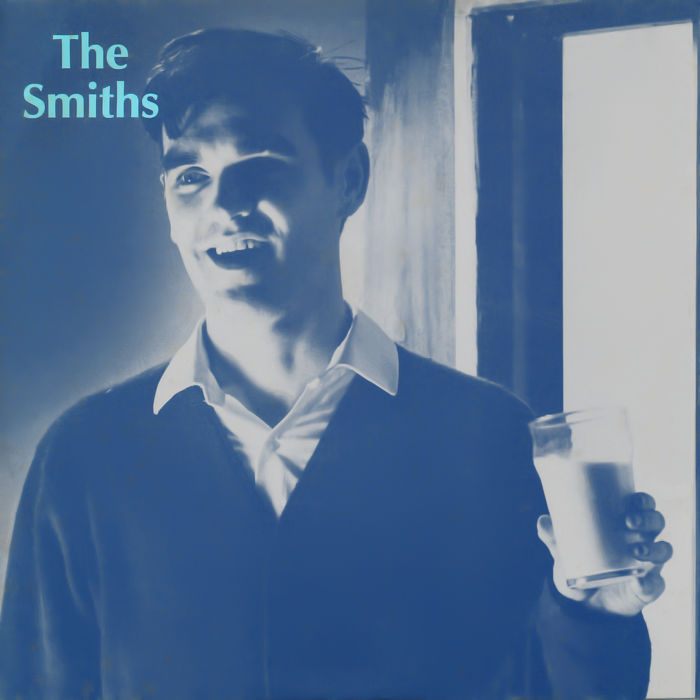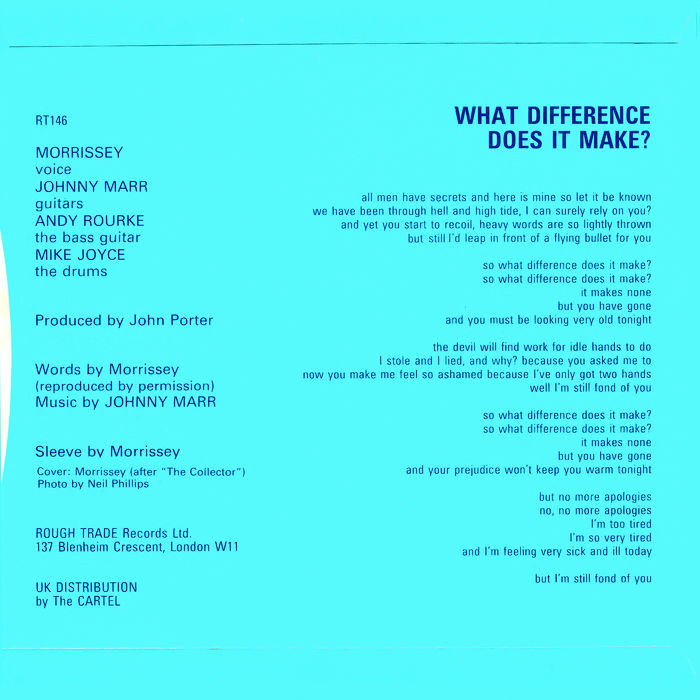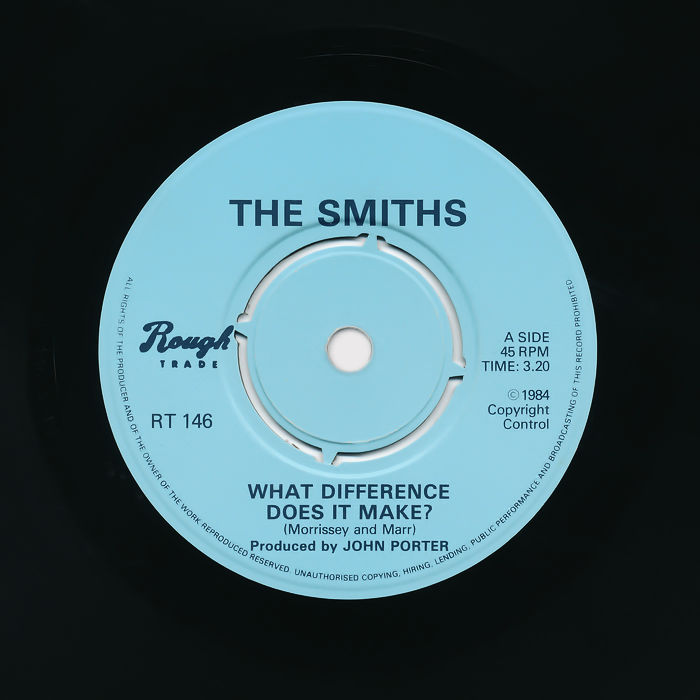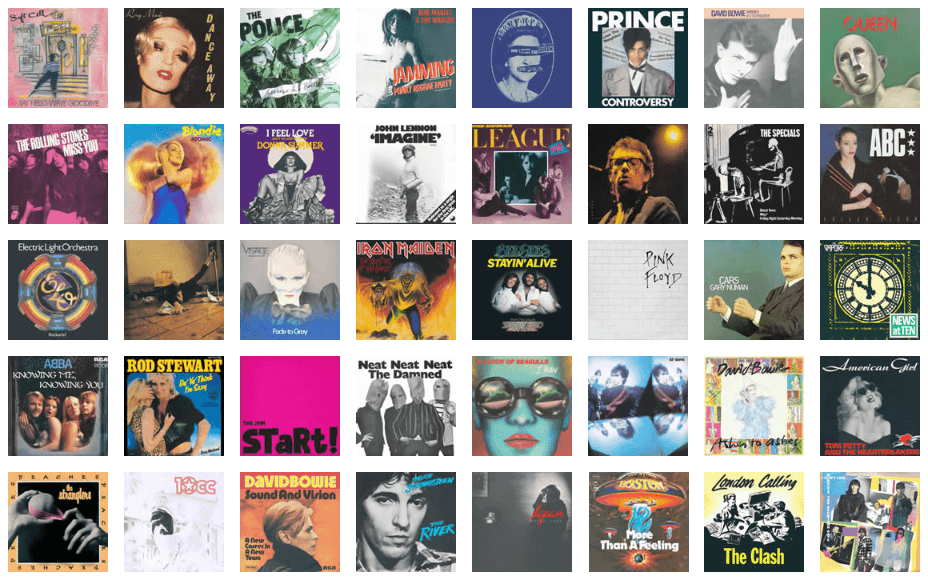The Story Behind The Song
John Lennon, Thom Yorke, Chris Martin and Michael Stipe are just a few of the great singer-songwriters who have later repudiated a song they recorded. Lennon was sharply critical of When I'm Sixty Four (a McCartney composition); Yorke describes Creep as "Crap"; Martin dislikes "Speed of Sound" because, ironically, they did not take the time to get it right; and Stipe dismisses Shiny Happy People as a "pop song for children".
To this august roll call of self-critics, we can add, perhaps unsurprisingly, the name of Morrissey, who has stated his distaste for the "facile" lyrics of "What Difference Does It Make?" Never shying away from controversy, he claimed they were similar to a Duran Duran composition. Ouch! Perhaps only he could be critical of his own work and turn it into an acerbic sideswipe.
The song is obviously about a close friendship damaged by the revelation of a secret. Although the nature of the disclosure is never explicitly revealed, it is clear that the friend has discovered that our protagonist is gay and reacts angrily: "Yet you start to recoil Heavy words are so lightly thrown". The friendship ends: "Now you know the truth about me you won't see me anymore".
Our protagonist cannot understand why his sexuality would change their long friendship. In fact, his friend's prejudice is what he would expect from someone much older and empathetically cold: "So what difference does it make? It makes none and you must be looking very old tonight". And later: "Your prejudice won't keep you warm tonight".
Despite the rejection, the protagonist still cares for his erstwhile friend ("I'd still leap in front of a flying bullet for you") and reflects on all the things he has done for him, including criminal activity, and he can only do so much ("I've only got two hands"). In fact, he's fed up of having to apologise for who he is but the song ends with a refrain repeated throughout the song: "I'm still fond of you."
In contrast to his own contribution, Morrissey describes the mesmerising music full of complex riffs as "majestic". Yet Marr is less than enthusiastic about the song, which was an early composition. "It was all right. I don't think it was particularly strong," he told Record Collector almost a decade later. "It went down great live, and that's when I liked it." At least the fans appreciated it: lyrics, music and all.
The cover art shows Terrence Stamp from the 1965 thriller The Collector, about a man who abducts a women so she might fall in love with him but she eventually dies in captivity. (Tangent: the film could be viewed as a sinister interpretation of Oscar Wilde's epigram "Each man kills the thing he loves"). Initially, permission to use the image was refused, so some copies have artwork in which Morrissey faithfully recreates the scene but holding a glass of milk (like the one shown here), which had to superimposed in the Stamp version beause he was actually grasping a chloroform pad. The film's tagline was "Almost A Love Story", and one wonders whether this was an oblique and darkly sarcastic reference to the song's lyrics.
No promotional video was made. Morrissey was critical of the medium, explaining to The Tube in 1984 that it would not last long and he wanted to accelerate its demise. In total, the Smiths produced 13 videos, but most of these involved images of live performances.
Let's end where we began. Are the lyrics facile? Lyrics do not have to be complex or cloaked in metaphor to be meaningful. In fact, good lyrics are like poems, evoking emotional responses in the listener but with a crucial difference: they are set to music. With the best songs, the music provides additional sentiment over and above the words, imparting an overall impression that is imponderably greater than the parts. Or put another way, the words and music fit - and apologies for the Smiths pun - hand in glove.
Marr's accompaniment would elevate even the most banal lines. Although the lyrics to "What Difference Does It Make?" might be less nuanced than some of Morrissey's other compositions, the theme is worthy and the lines memorable. Even if he rewrote them, we believe the original would not be bettered.
And, ironically, his self-criticism doesn't make any difference to the fans who love this track.
We hereby instate What Difference Does It Make? by The Smiths on The Wall as No.15 Best Single of 1984
The Smiths at their Top Of The Pops finest. Little wonder Morrissey didn't like it!Ant B




